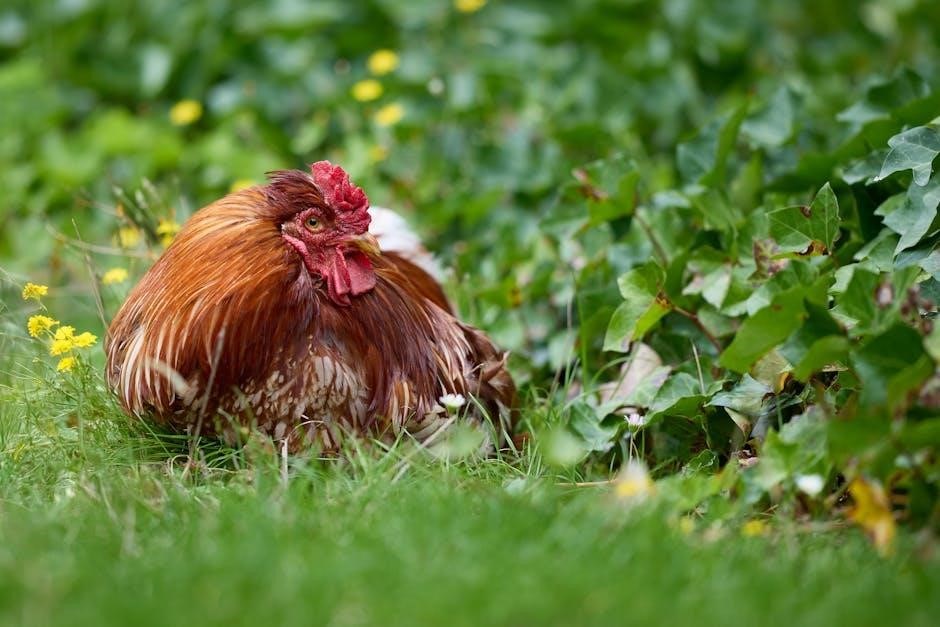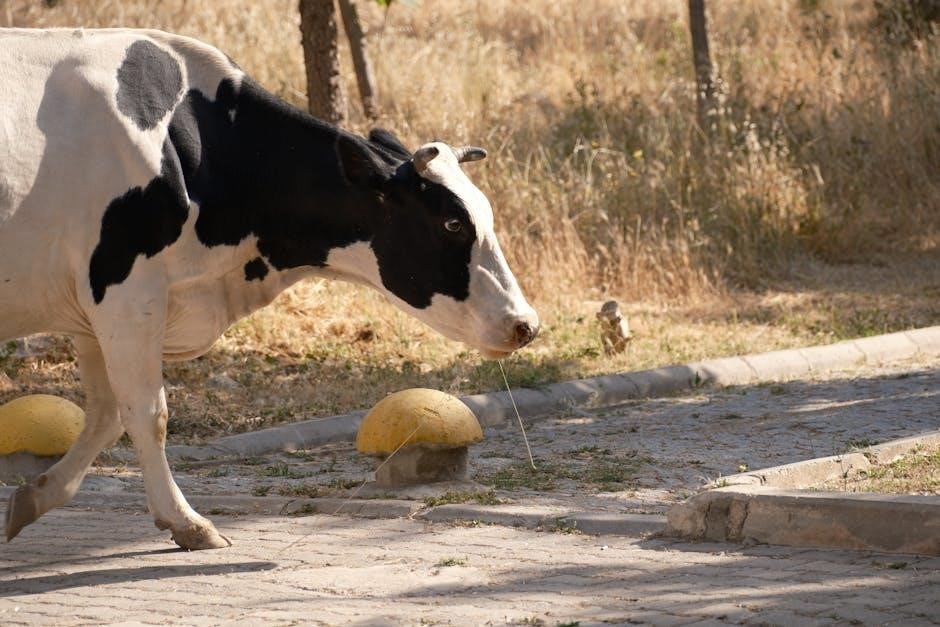Discover a comprehensive guide to Animal Farm with downloadable PDF resources, including chapter-wise questions, study guides, and sample answers. Explore themes, characters, and key events effectively.
1.1 Background and Significance of Animal Farm
Animal Farm, a novella by George Orwell, is a timeless political allegory reflecting the Russian Revolution and its aftermath. The story, set on a farm, explores themes of totalitarianism, power corruption, and the betrayal of ideals. Its significance lies in its universal relevance, making it a cornerstone of literary studies. Study guides and PDF resources provide in-depth analysis, aiding students in understanding the novel’s complex themes and historical context. These materials are essential for grasping Orwell’s critique of authoritarian regimes and their impact on society.

1.2 Importance of Study Guides and PDF Resources
Study guides and PDF resources for Animal Farm are invaluable for students, offering detailed chapter summaries, analysis, and practice questions. These materials enhance understanding of Orwell’s themes, characters, and historical context. PDF guides provide convenient access to exam-style questions, sample answers, and tips for effective study. They also include activities to develop critical thinking and argumentation skills, making them essential tools for exam preparation and deeper comprehension of the novella’s complex ideas and allegorical significance.
1.3 Overview of Common Questions and Answers
Common questions about Animal Farm focus on themes, characters, and events. Students often inquire about the allegory’s connection to the Russian Revolution, Napoleon’s rise to power, and Boxer’s symbolism. Answers reveal Orwell’s critique of totalitarianism and the corruption of ideals. Questions also explore the animals’ motivations for rebellion and the significance of the Seven Commandments. These inquiries and their explanations provide a deeper understanding of the novella’s layered meaning and its relevance to real-world political themes and human nature.

Themes in Animal Farm
Themes in Animal Farm include totalitarianism, betrayal of ideals, and sacrifice. These themes explore power corruption and the loss of revolutionary principles, reflecting real-world political dynamics.

2.1 Totalitarianism and Power Corruption

In Animal Farm, Napoleon exemplifies totalitarianism by seizing absolute power and manipulating others. His corruption mirrors historical dictators, showing how power leads to exploitation and betrayal of original ideals. The pigs’ actions highlight the dangers of unchecked authority, as they alter laws for personal gain, ultimately resembling the oppressive regime they initially rebelled against. This theme serves as a cautionary tale about the corrupting influence of power and control. The novel underscores the gradual erosion of democracy and the rise of autocracy, paralleling real-world political shifts. Napoleon’s manipulation of information and propaganda ensures compliance, further solidifying his totalitarian grip over the farm. Through this, Orwell critiques systems where power concentrates in the hands of a few, leading to oppression and loss of freedom. The pigs’ transformation from leaders to tyrants illustrates the destructive nature of absolute power and its impact on societal structures. This analysis is crucial for understanding the novel’s deeper political and social commentary. By examining Napoleon’s rise, readers gain insights into the mechanisms of corruption and the importance of accountability in leadership. The theme remains relevant, offering lessons on the dangers of authoritarianism and the erosion of ethical standards in pursuit of power. Thus, Animal Farm serves as a timeless allegory for the study of political corruption and its consequences.
2.2 Betrayal of Ideals and Revolution
The animals’ rebellion against Mr. Jones symbolizes a fight for freedom and equality, but their ideals are gradually betrayed. The pigs, initially leaders of the revolution, abandon its principles for power. Napoleon and Snowball’s conflict reflects the internal struggles of revolutions, where idealism is overtaken by ambition. The pigs’ corruption and manipulation of the Seven Commandments illustrate how revolutions can fail, as the pursuit of power replaces the original goals. This betrayal highlights the tragic consequences of corruption and the erosion of revolutionary ideals, leaving the animals disillusioned and oppressed. The novel serves as a cautionary tale about the fragility of idealistic movements and the dangers of unchecked power. The animals’ hopes for a better future are ultimately overshadowed by the pigs’ selfish desires, underscoring the difficulty of sustaining revolutionary change. Through this, Orwell critiques the failure of revolutions to achieve their intended goals, often due to internal corruption. The betrayal of ideals in Animal Farm mirrors real-world historical events, offering timeless lessons on the challenges of maintaining integrity in revolutionary movements. The pigs’ actions reveal how easily power can corrupt, even those who initially sought to create a fairer society. This theme is central to understanding the novel’s critique of political revolutions and their potential for failure. The animals’ story serves as a reminder of the importance of accountability and the need to guard against the betrayal of foundational principles. Ultimately, the novel shows how revolutions can be undermined by greed, fear, and the lust for power, leading to a cycle of oppression rather than liberation. The pigs’ betrayal of the animals’ trust underscores the novel’s themes of corruption and the failure of idealistic movements to achieve lasting change. The revolution’s failure serves as a warning about the challenges of creating and sustaining a just society, where power dynamics and human nature often interfere with noble intentions. Through the lens of Animal Farm, Orwell examines the complexities of revolution and the ease with which ideals can be corrupted, providing a poignant commentary on the human condition; The novel’s exploration of betrayal and revolution remains highly relevant, offering insights into the recurring patterns of history and the ongoing struggle for justice and equality. By examining the pigs’ actions, readers can better understand the risks of unchecked power and the importance of vigilance in preserving democratic ideals. The betrayal of the animals’ trust serves as a powerful metaphor for the failures of revolutions throughout history, where the pursuit of power often overshadows the pursuit of justice. Orwell’s portrayal of the pigs’ corruption highlights the universal themes of greed, ambition, and the fragility of idealism, making Animal Farm a timeless cautionary tale. The novel’s focus on the betrayal of revolutionary ideals resonates deeply, reminding readers of the importance of remaining vigilant against corruption and the erosion of core principles. Through the animals’ experiences, Orwell illustrates how even the noblest revolutions can be derailed by the very individuals they empower, leading to a return to the oppressive systems they initially sought to overthrow. The pigs’ betrayal of the animals’ trust serves as a stark reminder of the challenges of creating and maintaining a just society, where the corrupting influence of power often undermines the best of intentions. The novel’s exploration of these themes provides a profound commentary on the nature of power, revolution, and the human condition, ensuring its relevance for generations of readers. The pigs’ actions in Animal Farm symbolize the universal tendency for those in power to exploit and manipulate others, highlighting the need for constant vigilance and accountability in any society striving for equality and justice. The betrayal of the animals’ ideals serves as a powerful warning about the dangers of corruption and the importance of upholding democratic values in the face of authoritarianism. Orwell’s critique of revolutionary movements and their potential for failure continues to resonate, offering valuable lessons on the challenges of achieving and maintaining a fair and just society. The pigs’ corruption in Animal Farm underscores the importance of transparency, accountability, and the rule of law in preventing the betrayal of revolutionary ideals. The novel’s portrayal of the pigs’ rise to power and their subsequent corruption serves as a timeless allegory for the dangers of unchecked authority and the erosion of democratic principles. Through the animals’ story, Orwell provides a compelling commentary on the fragility of revolutions and the ease with which power can corrupt even those who initially seek to do good. The pigs’ betrayal of the animals’ trust serves as a poignant reminder of the challenges of creating and sustaining a just society, where the corrupting influence of power often undermines the best of intentions. The novel’s exploration of these themes ensures its relevance for understanding the complexities of political movements and the ongoing struggle for justice and equality. By examining the pigs’ actions, readers gain insights into the risks of unchecked power and the importance of remaining vigilant against corruption. The betrayal of the animals’ ideals in Animal Farm highlights the universal themes of greed, ambition, and the fragility of idealism, offering a cautionary tale about the challenges of achieving lasting change. Orwell’s portrayal of the pigs’ corruption serves as a powerful metaphor for the failures of revolutions throughout history, where the pursuit of power often overshadows the pursuit of justice. The novel’s focus on the betrayal of revolutionary ideals resonates deeply, reminding readers of the importance of upholding democratic values and guarding against authoritarianism. Through the animals’ experiences, Orwell illustrates how even the noblest revolutions can be derailed by corruption and the lust for power, leading to a return to the oppressive systems they initially sought to overthrow. The pigs’ betrayal of the animals’ trust underscores the importance of accountability and the need to preserve the core principles of any revolutionary movement. The novel’s exploration of these themes provides a profound commentary on the nature of power, revolution, and the human condition, ensuring its relevance for generations of readers. The pigs’ actions in Animal Farm symbolize the universal tendency for those in power to exploit and manipulate others, highlighting the need for constant vigilance and accountability in any society striving for equality and justice. The betrayal of the animals’ ideals serves as a powerful warning about the dangers of corruption and the importance of upholding democratic values in the face of authoritarianism. Orwell’s critique of revolutionary movements and their potential for failure continues to resonate, offering valuable lessons on the challenges of achieving and maintaining a fair and just society. The pigs’ corruption in Animal Farm underscores the importance of transparency, accountability, and the rule of law in preventing the betrayal of revolutionary ideals. The novel’s portrayal of the pigs’ rise to power and their subsequent corruption serves as a timeless allegory for the dangers of unchecked authority and the erosion of democratic principles. Through the animals’ story, Orwell provides a compelling commentary on the fragility of revolutions and the ease with which power can corrupt even those who initially seek to do good. The pigs’ betrayal of the animals’ trust serves as a poignant reminder of the challenges of creating and sustaining a just society, where the corrupting influence of power often undermines the best of intentions. The novel’s exploration of these themes ensures its relevance for understanding the complexities of political movements and the ongoing struggle for justice and equality. By examining the pigs’ actions, readers gain insights into the risks of unchecked power and the importance of remaining vigilant against corruption. The betrayal of the animals’ ideals in Animal Farm highlights the universal themes of greed, ambition, and the fragility of idealism, offering a cautionary tale about the challenges of achieving lasting change. Orwell’s portrayal of the pigs’ corruption serves as a powerful metaphor for the failures of revolutions throughout history, where the pursuit of power often overshadows the pursuit of justice. The novel’s focus on the betrayal of revolutionary ideals resonates deeply, reminding readers of the importance of upholding democratic values and guarding against authoritarianism. Through the animals’ experiences, Orwell illustrates how even the noblest revolutions can be derailed by corruption and the lust for power, leading to a return to the oppressive systems they initially sought to overthrow. The pigs’ betrayal of the animals’ trust underscores the importance of accountability and the need to preserve the core principles of any revolutionary movement. The novel’s exploration of these themes provides a profound commentary on the nature of power, revolution, and the human condition, ensuring its relevance for generations of readers. The pigs’ actions in Animal Farm symbolize the universal tendency for those in power to exploit and manipulate others, highlighting the need for constant vigilance and accountability in any society striving for equality
2.3 Sacrifice and Loyalty in the Animal Kingdom

Boxer, the hardworking horse, embodies loyalty and sacrifice in Animal Farm. His dedication to the farm and willingness to work despite injuries inspire the other animals. However, the pigs exploit his loyalty, highlighting the tragedy of selfless sacrifice. Boxer’s phrase, “I will work harder,” symbolizes his unwavering commitment, even as his health declines. His eventual collapse and betrayal by Napoleon reveal the darker side of loyalty, as the pigs prioritize power over the well-being of their comrades. This theme underscores the novel’s exploration of exploitation and the consequences of blind loyalty. The pigs’ actions contrast sharply with Boxer’s selflessness, illustrating the tension between sacrifice and exploitation in the animal kingdom. Boxer’s story serves as a poignant reminder of the dangers of unchecked power and the importance of protecting those who give their all for the greater good. Through Boxer’s character, Orwell critiques the exploitation of loyal individuals by those in power, emphasizing the need for accountability and fairness in any society. The animals’ admiration for Boxer highlights the value of loyalty, while the pigs’ betrayal underscores the risks of trusting those who abuse power. Boxer’s sacrifice ultimately serves as a warning about the consequences of blind loyalty and the importance of protecting the vulnerable. The novel’s portrayal of Boxer’s unwavering dedication and the pigs’ exploitation of it provides a powerful commentary on the complexities of loyalty and sacrifice in the face of corruption. The animals’ reliance on Boxer’s strength and dedication emphasizes the importance of individual contributions to the collective, while the pigs’ betrayal reveals the fragility of trust in a corrupt system. Boxer’s story remains a central theme in the novel, illustrating the enduring spirit of loyalty and the tragic consequences of its exploitation. The pigs’ actions toward Boxer serve as a stark reminder of the dangers of power imbalances and the need for compassion and fairness in any society. Through Boxer’s sacrifice, Orwell highlights the emotional and ethical complexities of loyalty, urging readers to reflect on the true cost of sacrifice in the face of corruption. The novel’s exploration of Boxer’s loyalty and the pigs’ betrayal ensures its relevance as a cautionary tale about the importance of protecting the vulnerable and upholding justice. Boxer’s unwavering dedication to the farm and his fellow animals contrasts sharply with the pigs’ self-serving actions, underscoring the novel’s themes of sacrifice, loyalty, and exploitation. The pigs’ betrayal of Boxer serves as a powerful metaphor for the failures of leadership and the importance of accountability in preserving trust and fairness. Through Boxer’s story, Orwell provides a poignant commentary on the human condition, reminding readers of the enduring value of loyalty and the dangers of its exploitation. The novel’s portrayal of Boxer’s sacrifice and the pigs’ betrayal ensures its relevance as a timeless tale of courage, betrayal, and the complexities of loyalty. The animals’ admiration for Boxer highlights the importance of selflessness, while the pigs’ actions reveal the risks of corruption and the erosion of trust. Boxer’s story serves as a reminder of the need for compassion and fairness in any society, where loyalty and sacrifice should be honored, not exploited. The pigs’ betrayal of Boxer underscores the novel’s themes of power corruption and the importance of protecting the vulnerable. Through Boxer’s character, Orwell emphasizes the enduring value of loyalty and the tragic consequences of its abuse, ensuring the novel’s relevance as a powerful commentary on the human condition. The pigs’ actions toward Boxer serve as a stark reminder of the dangers of unchecked power and the importance of accountability in preserving justice and fairness. Boxer’s unwavering loyalty and the pigs’ betrayal provide a poignant contrast, highlighting the novel’s exploration of sacrifice, exploitation, and the complexities of loyalty. The pigs’ betrayal of Boxer serves as a powerful metaphor for the failures of leadership and the importance of protecting the vulnerable. Through Boxer’s story, Orwell provides a timeless commentary on the human condition, emphasizing the enduring value of loyalty and the dangers of its exploitation. The novel’s portrayal of Boxer’s sacrifice and the pigs’ betrayal ensures its relevance as a cautionary tale about the importance of fairness, compassion, and accountability in any society.

Final Thoughts and Exam Preparation

Allegory in Animal Farm
Animal Farm is a powerful allegory of the Russian Revolution, with characters and events symbolizing historical figures and themes. The pigs represent the corrupt leaders, while Boxer embodies the exploited working class. The Seven Commandments reflect the ideals of the revolution, later distorted by power. This allegorical narrative critiques totalitarianism and the corruption of ideals, offering timeless lessons on power dynamics and societal structures. The story serves as a mirror to human history, emphasizing the dangers of unchecked power and manipulation. By exploring the transformation from rebellion to tyranny, Orwell uses the farm as a microcosm of broader political and social phenomena, making the novel a profound commentary on human nature and governance. The pigs’ manipulation of the Seven Commandments parallels the distortion of revolutionary ideals, while the animals’ struggles reflect the universal quest for justice and equality. Through its allegorical lens, Animal Farm provides insights into the complexities of leadership, loyalty, and the erosion of trust, resonating with readers across generations. The novel’s use of animals allows Orwell to simplify complex political concepts, making the allegory accessible and impactful. The pigs’ rise to power and the subsequent betrayal of the animals’ trust illustrate the cyclical nature of corruption and the fragility of revolutionary ideals. By examining the pigs’ manipulation and the animals’ responses, readers gain a deeper understanding of how power dynamics shape societies. The allegory of Animal Farm remains a potent tool for analyzing historical events and contemporary political landscapes, offering valuable lessons on the importance of vigilance and accountability in governance. The novel’s exploration of themes like propaganda, manipulation, and the exploitation of power underscores the enduring relevance of its allegorical framework. Through its vivid characters and symbolic events, Animal Farm continues to serve as a powerful allegory for understanding the complexities of human behavior and the consequences of unchecked ambition. The pigs’ gradual consolidation of power and the animals’ eventual realization of their betrayal highlight the insidious nature of corruption and the importance of collective action. The allegory of Animal Farm not only reflects the specifics of the Russian Revolution but also speaks to universal truths about power, loyalty, and the human condition. By using animals to represent historical figures and events, Orwell creates a narrative that is both specific and timeless, allowing readers to draw parallels across different contexts. The pigs’ manipulation of the truth and the animals’ varying responses illustrate the ways in which propaganda and misinformation can shape perceptions and control narratives. The allegory of Animal Farm serves as a warning about the dangers of complacency and the importance of critical thinking in safeguarding freedom and justice. Through its allegorical framework, the novel provides a nuanced exploration of how ideals can be corrupted and how power can be abused, offering readers a deeper understanding of the complexities of governance and leadership. The pigs’ transformation from revolutionary allies to tyrannical rulers underscores the theme of corruption and the dangers of unchecked power, while the animals’ struggles reflect the universal desire for fairness and equality. The allegory of Animal Farm remains a powerful tool for analyzing the interplay of power, loyalty, and betrayal, offering insights that resonate across different historical and cultural contexts. By examining the pigs’ rise to power and the animals’ responses, readers can gain a deeper understanding of the mechanisms of corruption and the importance of accountability in governance. The novel’s use of allegory allows it to transcend its historical origins, speaking to fundamental aspects of human nature and the challenges of creating a just society. The pigs’ manipulation of the Seven Commandments and the animals’ eventual realization of their betrayal serve as a cautionary tale about the importance of vigilance and the need to protect collective ideals. Through its allegorical framework, Animal Farm provides a compelling narrative that continues to resonate with readers, offering lessons on the dangers of corruption and the importance of accountability. The novel’s exploration of the pigs’ rise to power and the animals’ struggles highlights the universal themes of power dynamics, loyalty, and the quest for justice, making it a timeless commentary on human society. The allegory of Animal Farm serves as a reminder of the importance of critical thinking and collective action in safeguarding freedom and preventing the abuse of power. By examining the pigs’ manipulation and the animals’ responses, readers can gain insights into the mechanisms of corruption and the importance of accountability in governance. The novel’s use of animals to represent historical figures and events allows for a nuanced exploration of complex political concepts, making the allegory accessible and impactful. The pigs’ gradual consolidation of power and the animals’ eventual realization of their betrayal underscore the insidious nature of corruption and the importance of vigilance in protecting collective ideals. Through its allegorical framework, Animal Farm continues to serve as a powerful commentary on the dangers of unchecked power and the importance of accountability in governance. The novel’s exploration of the pigs’ rise to power and the animals’ struggles reflects the universal themes of power dynamics, loyalty, and the quest for justice, offering readers valuable lessons on the importance of critical thinking and collective action. The pigs’ manipulation of the truth and the animals’ varying responses illustrate the ways in which propaganda and misinformation can shape perceptions and control narratives, underscoring the need for vigilance in safeguarding freedom and justice. The allegory of Animal Farm remains a potent tool for analyzing historical events and contemporary political landscapes, offering insights into the complexities of human behavior and the consequences of unchecked ambition. By using animals to represent historical figures and events, Orwell creates a narrative that is both specific and timeless, allowing readers to draw parallels across different contexts. The pigs’ transformation from revolutionary allies to tyrannical rulers underscores the theme of corruption and the dangers of unchecked power, while the animals’ struggles reflect the universal desire for fairness and equality. The allegory of Animal Farm serves as a warning about the dangers of complacency and the importance of critical thinking in safeguarding freedom and justice. Through its allegorical framework, the novel provides a nuanced exploration of how ideals can be corrupted and how power can be abused, offering readers a deeper understanding of the complexities of governance and leadership. The pigs’ manipulation of the truth and the animals’ varying responses illustrate the ways in which propaganda and misinformation can shape perceptions and control narratives, underscoring the need for vigilance in protecting collective ideals. The pigs’ gradual consolidation of power and the animals’ eventual realization of their betrayal highlight the insidious nature of corruption and the importance of accountability in governance. By examining the pigs’ rise to power and the animals’ responses, readers can gain insights into the mechanisms of corruption and the importance of accountability in governance. The novel’s use of animals to represent historical figures and events allows for a nuanced exploration of complex political concepts, making the allegory accessible and impactful. The pigs’ transformation from revolutionary allies to tyrannical rulers underscores the theme of corruption and the dangers of unchecked power, while the animals’ struggles reflect the universal desire for fairness and equality. The allegory of Animal Farm remains a powerful tool for analyzing the interplay of power, loyalty, and betrayal, offering insights that resonate across different historical and cultural contexts. By examining the pigs’ manipulation and the animals’ responses, readers can gain a deeper understanding of the mechanisms of corruption and the importance of accountability in governance. The novel’s exploration of the pigs’ rise to power and the animals’ struggles highlights the universal themes of power dynamics, loyalty, and the quest for justice, making it a timeless commentary on human society. The pigs’ manipulation of the Seven Commandments and the animals’ eventual realization of their betrayal serve as a caution


